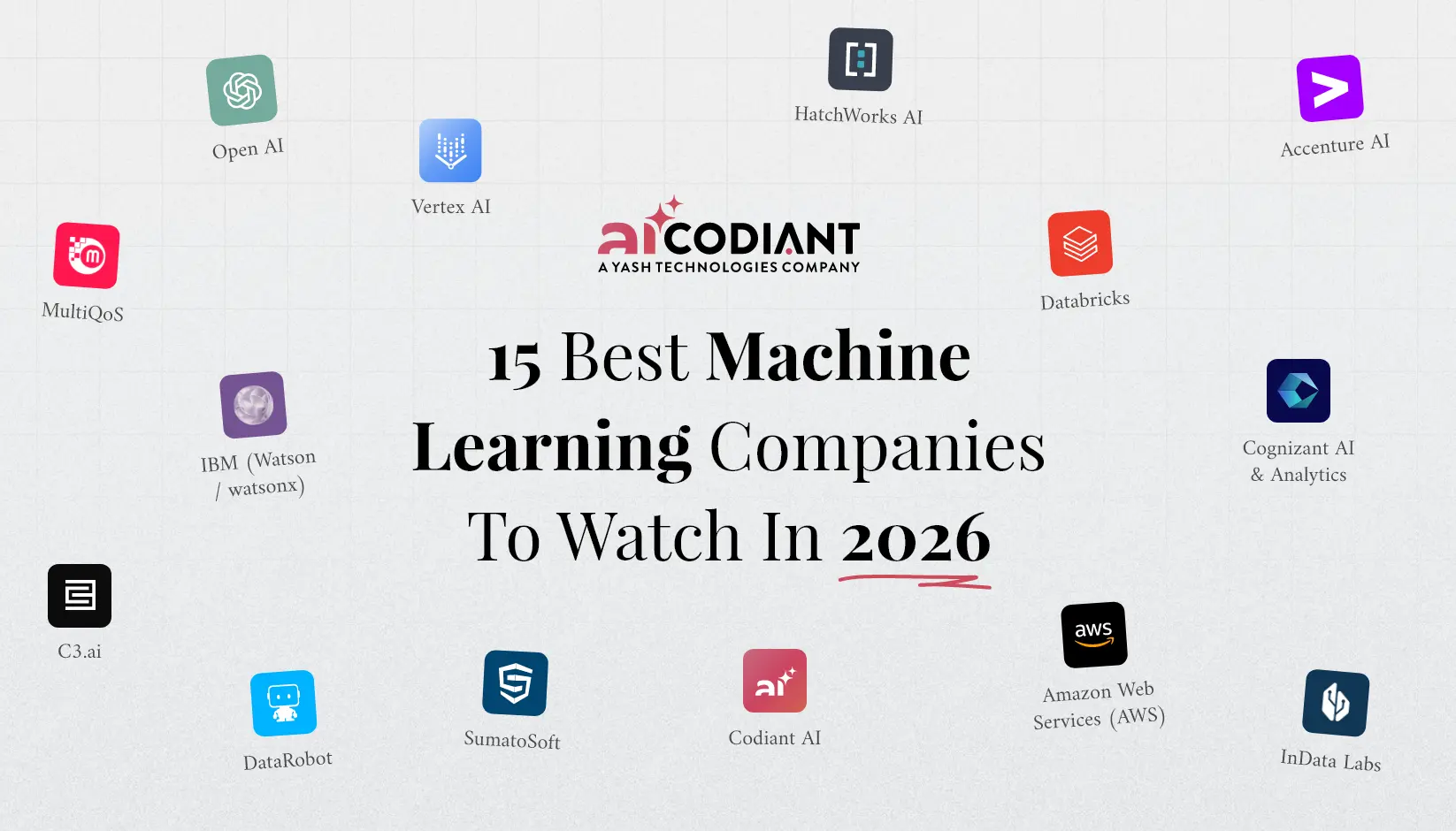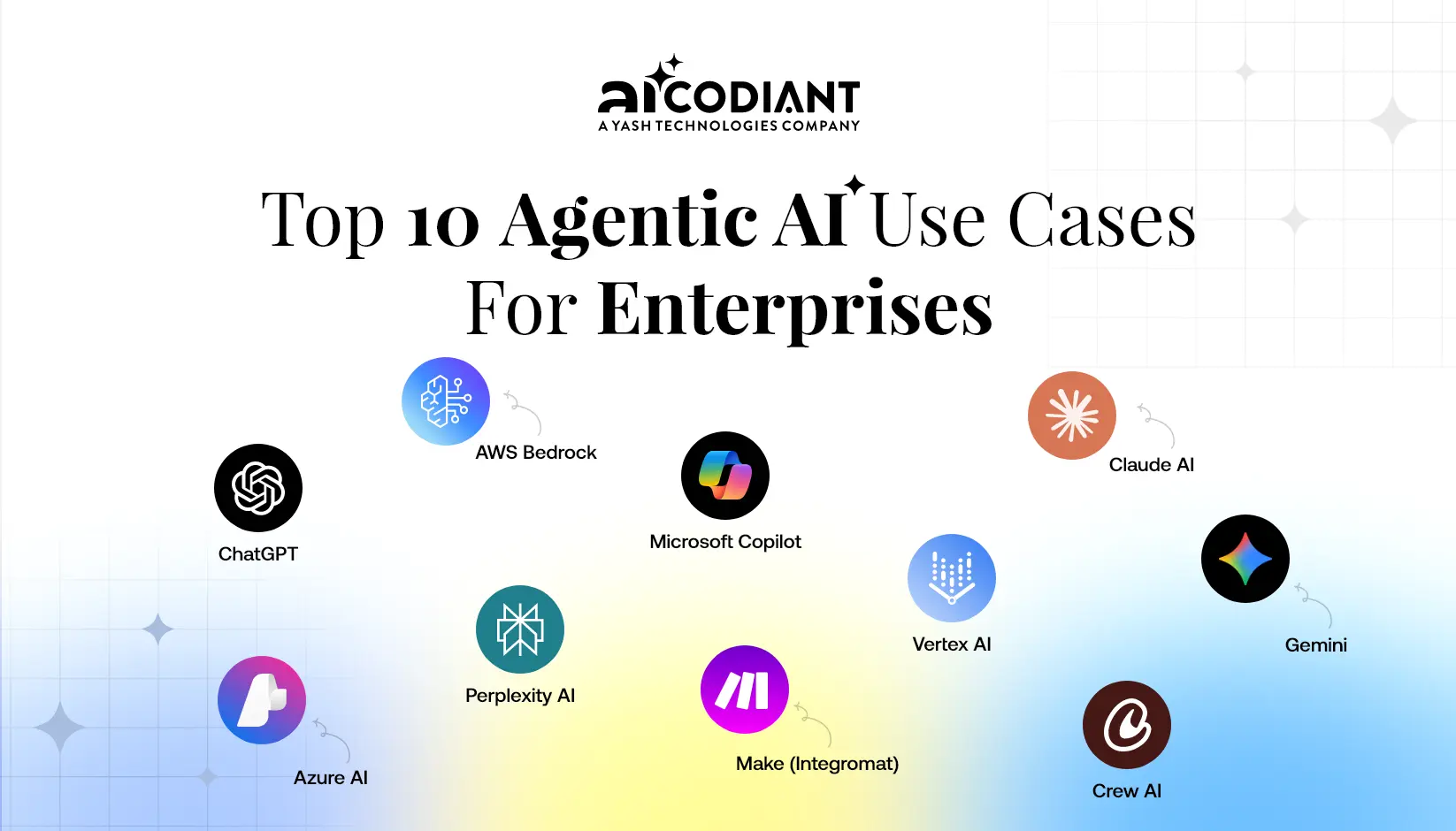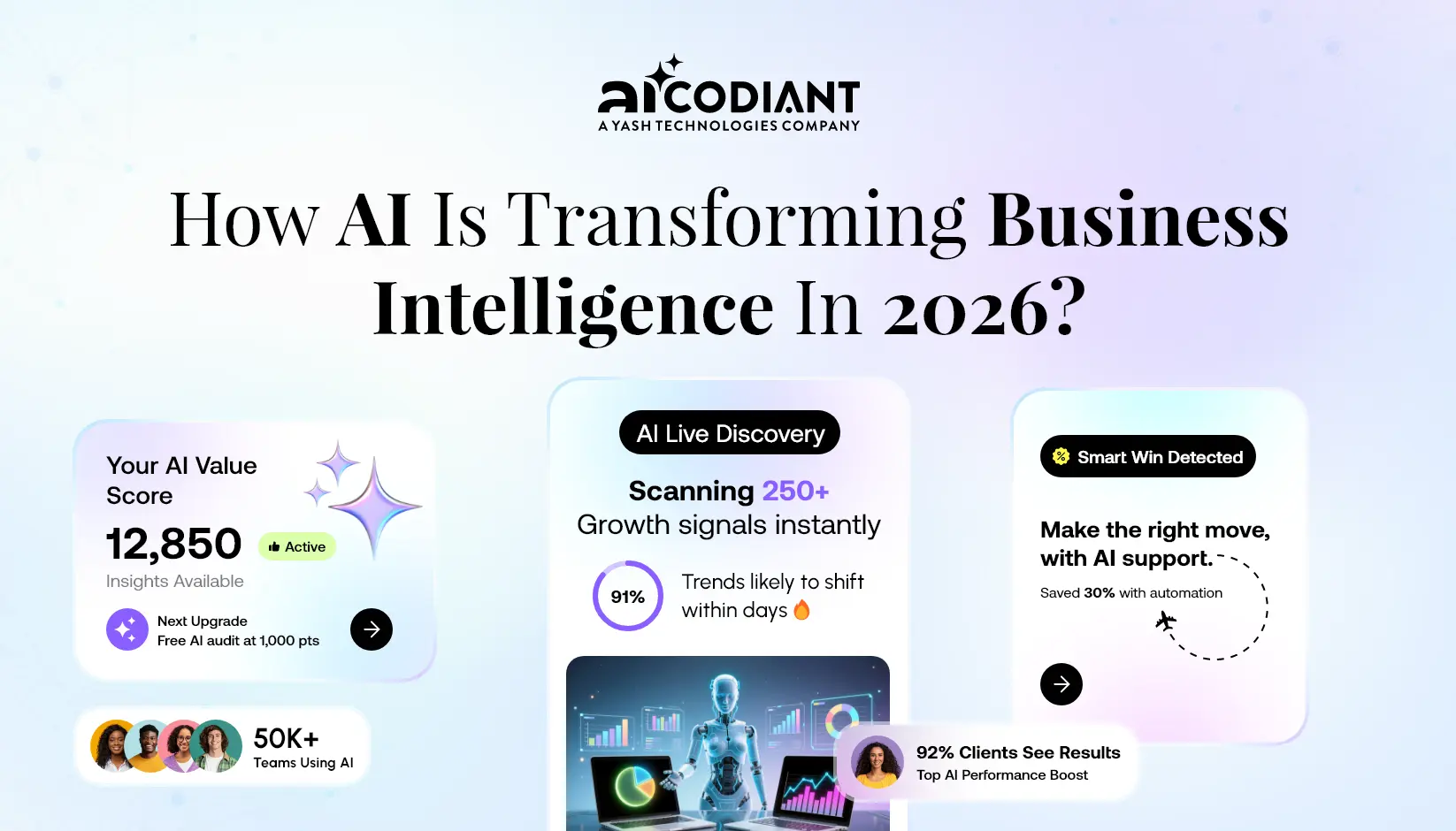How Much Does AI App Development Cost? Your Only Guide
Table of Contents
Subscribe To Our Newsletter
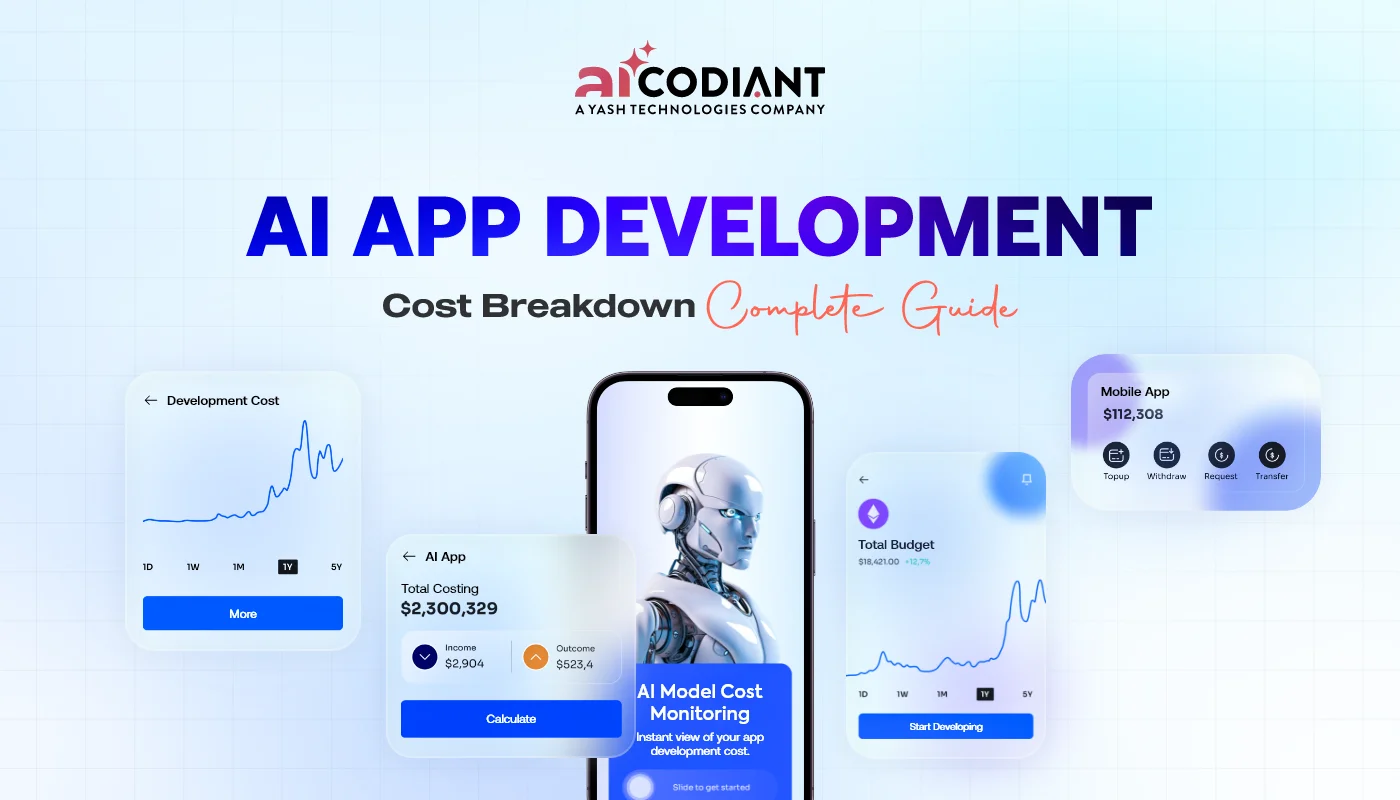
You’ve probably noticed it: AI apps are everywhere. From voice assistants that schedule your meetings to AI tutors helping kids with math – intelligent apps are reshaping how we live and work.
And for good reason. AI delivers personalization, automation and speed that traditional apps just can’t match. Whether you’re building an AI fitness coach, a virtual support bot or a recommendation engine, investing in AI app development can open serious opportunities. But there’s one question every founder or product manager runs into early – How much will it cost to build?
That’s exactly what this guide is here to unpack.
We’re cutting through the guesswork to help you understand what really influences the cost of AI app development – from the types of AI features you choose to the size of your development team. If you are planning your roadmap this breakdown will give you the clarity you need to budget smarter and scale confidently.
Why Businesses Are Betting Big on AI Apps
Every minute you delay AI adoption, your competitors get a step ahead.
Hospitals now use AI to catch early signs of disease. Fintech firms approve loans with real-time risk scoring. Retailers? They’re running smarter inventory and personalizing every customer touchpoint. And it’s not limited to just these, AI is making an impact across many other sectors as well.
Here’s what the numbers say:
Companies using AI see up to 20% lower operational costs and 15% higher customer satisfaction (McKinsey).
And the market? AI-driven mobile apps are growing at a 28% CAGR through 2030 (Allied Market Research).
With returns like that, more companies are treating AI not as an experiment—but as a core part of their growth strategy.
Ready to Turn AI into ROI?
Let our experts help you build intelligent apps that boost efficiency and delight users.
Factors That Influence the Cost of AI App Development
1. Type of AI App
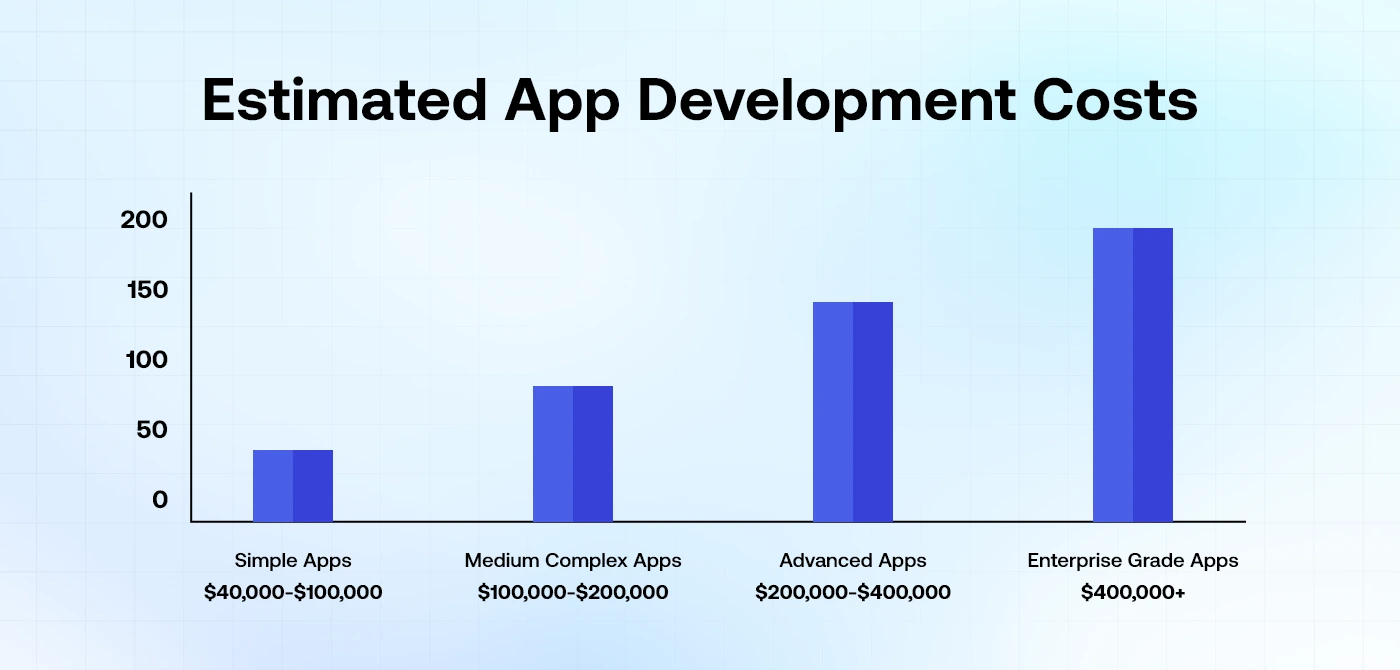
Not all AI apps are built equal. A simple AI chatbot for handling FAQs might cost around $8,000–$20,000, while a personalized health tracker that syncs wearables, uses AI to detect patterns and gives custom recommendations can cross $60,000.
The purpose, end-user interaction, and data intensity define the foundation – and ultimately, the spend. A recommendation engine for an eCommerce app, for instance is far more complex than a rule-based assistant for booking appointments. The more specialized your app’s goal, the more you’ll need to invest in logic, flow and precision.
2. Industry Impacts Investment
AI app development isn’t one-size-fits-all – and your industry plays a big role in shaping cost, complexity and compliance needs.
Why? Because each industry comes with its own expectations, data sensitivity, user behavior and regulations. Building an AI-powered app for eCommerce may prioritize speed and personalization, while in healthcare or finance you’re dealing with strict privacy laws, mission-critical accuracy and zero tolerance for error.
Highly regulated industries like healthcare, insurance or legal often demand additional time for model validation compliance checks (like HIPAA or GDPR) and rigorous testing – all of which increase cost.

For example, we built Scribeflo, an AI-powered medical scribe app tailored for healthcare providers. Because it operates in a highly regulated domain, development required HIPAA-compliant architecture advanced voice recognition and airtight data security. These industry-specific demands increased both the timeline and investment – but were essential for delivering a safe accurate and trusted solution for clinicians.
Average AI App Development Cost by Industry (2025)
| Industry | Average Cost Range (USD) |
|---|---|
| Healthcare & Lifesciences | $80,000 – $200,000+ |
| E-Commerce Solutions | $40,000 – $100000 |
| Transport & Logistics | $50,000 – $120,000 |
| Social Networking | $60,000 – $130,000 |
| Real Estate | $45,000 – $110,000 |
| Education & eLearning | $35,000 – $90,000 |
| Banking, Finance & Insurance | $80,000 – $180000 |
| Travel & Hospitality | $50,000 – $110,000 |
| Enterprise Retail & Manufacturing | $90,000 – $250,000+ |
| Oil & Gas | $100000 – $300,000+ |
| Media & Entertainment | $60,000 – $150,000 |
| On-Demand Delivery | $40,000 – $100,000 |
| Home Services | $30,000 – $80,000 |
| Fintech | $70,000 – $160,000 |
| mCommerce | $35000 – $90,000 |
3. AI Model Used
Your cost also hinges on how smart you want your AI to be – and where that intelligence comes from. Using pre-trained models like GPT-4, Google’s BERT or OpenAI’s Whisper gives you a jumpstart. It’s faster and more affordable often adding $5,000–$15,000 depending on API usage and licensing.
But if you need a custom-trained model for niche datasets – say, for interpreting legal documents or medical scans – the cost and time rise quickly, potentially reaching $40,000+ just for model development and tuning. Pre-built means quick setup. Custom means more control, more cost.
4. AI-First UI/UX Design
AI might drive your app’s intelligence – but design is what users actually interact with. A smart layout makes AI features feel natural and easy to use. Whether it’s visualizing predictions, guiding users through a voice interaction or simplifying complex analytics, AI-first design is crucial.
For example, we designed CalCounts, an AI-powered calorie tracking app that combines minimal UI with intuitive user flows. From smart onboarding to real-time food tracking, the app’s clean design has helped boost retention and ease of use – especially for first-time health app users.

Expect to invest $5,000–$20,000 on UI/UX depending on complexity, user roles, and feature sets. Great design makes AI feel invisible—and incredibly usable.
5. Level of AI Complexity
There’s a big difference between adding a simple price prediction tool and building an app that understands human emotion in voice tone. If your app uses basic machine learning (like trend analysis) costs stay modest. But layering deep learning, NLP or computer vision requires data pipelines, advanced training and rigorous testing – which pushes the budget up.
For example, adding NLP for sentiment analysis might cost $10,000–$25000, but integrating real-time facial recognition or voice-driven interactions can reach $50,000+ especially when accuracy matters.
AI App Cost by Complexity
| App Type | Timeline | Estimated Cost | Includes |
| Basic App | 3–6 months | $40,000 – $100,000 | Simple features, basic AI, MVP. |
| Medium App | 6–9 months | $100,000 – $200,000 | Custom UI, smart features. |
| Complex App | 9–12+ months | $200,000 – $400,000+ | Advanced AI, 2 platforms, full UI. |
6. Features & Functionalities
The more your app can do, the more it’ll cost – especially if those features involve real-time intelligence. Basic features like form-based AI replies or static text suggestions won’t break the bank.
But if you want AI to handle voice-to-text, personalized analytics or real-time video interpretation, the cost grows fast. A voice recognition system with AI-driven transcription can cost $15,000–$30000 alone. A predictive analytics dashboard for a SaaS product? Add $20,000–$40,000 depending on data complexity and UI needs.
AI App Features: What You Add Is What You Pay
| Complexity Level | What’s Included | Estimated Timeline | Cost |
| Lightweight Al App | Basic form-based Al responses, static suggestions, and simple user flows. Ideal for MVPs or internal tools with minimal Al processing. | 3-5 weeks | $10,000 |
| Smart Utility App | Adds chat interfaces, rule-based automation, and light personalization. Can include payment modules, dashboards, and multilingual support. | 5-8 weeks | $20,000 |
| Al-First App | Features like speech-to-text, custom GPT integrations, predictive analytics, or visual recognition. Heavy real-time Al involvement and tailored user journeys. | 8-14 weeks | $40,000- $80,000+ |
7. App Platform
Are you building just for iOS? Android? Or do you want one codebase to run everywhere? Native apps (iOS and Android separately) offer great performance but usually double the development effort.
Cross-platform frameworks like Flutter or React Native can cut costs by 20–40%, but come with trade-offs in customization and performance. Web-based AI apps may be cheaper upfront, but less engaging for mobile-first users. Platform decisions directly influence testing cycles, UI design and long-term maintenance.
Related reading: How to Build a RAG-Powered Application: Step-by-Step Process and Cost Breakdown
8. Backend & Infrastructure
AI doesn’t run on magic – it runs on powerful backend infrastructure. Your costs here depend on how your app stores, processes, and protects data. Do you need real-time data streaming? Third-party APIs? Scalable cloud hosting (AWS, Azure)? If so, budget at least $10,000–$25000 for backend and DevOps alone.
More complex pipelines – for example, apps that auto-train on new data – could push this to $50,000+. But the upside? Strong infrastructure reduces crashes, enables scale and protects sensitive data.
9. Team Structure & Location
Who builds your app is as important as what your app is built on. It costs $100–$200/hour per developer for an in-house team in the U.S. or Europe, but a skilled outsourcing team in India or Eastern Europe can reduce that to $25–$60/hour.
While the cost of a full-stack AI development engagement with a U.S. agency can run upwards of $150,000+ the same work can be outsourced to a vetted offshore dedicated partner for $40000–$90000 based on level of expertise and scope. And keep in mind that cheaper hourly rates do not always equal lesser final costs – experience counts.
How Much Does It Cost to Build an AI App?
Here’s a breakdown of typical cost of AI app development in 2025. These are estimated ranges based on project size, complexity, and team structure.
| Development Component | Estimated Cost Range (USD) | What It Covers |
| Strategy & Road mapping | $2,000 – $10,000 | Planning your app from scratch – what it should do, who it’s for and how AI fits in. |
| Design (UI/UX) | $5,000 – $20,000 | Designing the app screens and user flow so it’s easy, smooth and feels smart to use. |
| AI Model Setup | $10,000 – $50,000+ | Adding AI features like chat, recommendations, or image scanning – using ready-made or custom AI. |
| Core App Functionality | $15,000 – $60,000+ | Building main features like chatting, speaking, showing smart suggestions and handling user actions. |
| Server-Side & APIs | $10,000 – $30,000 | Setting up the behind-the-scenes system – databases, logins and connecting other tools or services. |
| Platform Development | $10,000 – $40,000 | Making your app work on iPhones, Android, websites or across all with AI fully integrated. |
| Testing & QA | $3,000 – $15,000 | Checking everything works well – no bugs, fast loading and accurate AI results. |
| Cloud & Hosting Setup | $5,000 – $25,000 | Setting up where your app and data will live securely – using cloud platforms like AWS or Google Cloud. |
| Data Security & Legal | $4,000 – $20,000 | Protecting user data and making sure your app follows privacy laws like GDPR or HIPAA. |
| Ongoing Maintenance | $2,000 – $10,000/year | Keeping your app running smoothly – fixing bugs, updating features and improving the AI over time. |
Want a Precise Quote for Your AI App?
Skip the guesswork. Share your idea, and we’ll give you a tailored cost estimate—no strings attached.
How Different AI App Types Impact Development Cost
The type of AI functionality you build heavily impacts your overall budget. Some AI use cases are quick to implement using pre-built models, while others demand custom training, larger datasets and more advanced engineering. Here’s how the cost varies across popular AI app types in 2025:
| AI App Type | Estimated Cost (USD) | What It Involves |
|---|---|---|
| AI Chatbot | $8,000 – $25,000 | Handles basic queries, live chat or support automation using NLP. |
| Voice Assistant | $20,000 – $60000 | Includes speech-to-text, natural conversation flow and real-time voice processing. |
| Recommendation Engine | $15,000-$50,000 | Suggests products/content based on user behavior, preferences or context. |
| Predictive Analytics App | $20,000 – $70000 | Uses historical data to forecast trends, behaviors or risks. |
| Image Recognition App | $25,000-$80,000 | Identifies images, objects, or faces – often used in security, retail or health. |
| AI Personal Coach (Fitness, Finance etc.) | $30,000-$90,000 | Tracks user behavior, gives personalized feedback using ML and real-time data. |
| AI Scribe/Transcription App | $35,000-$100,000+ | Converts speech into structured documentation – commonly used in healthcare/legal. |
Strategies to Reduce AI App Development Costs
Worried about your AI powered app development cost spiraling out of control? The good news – there are smart ways to manage expenses without cutting corners. Here’s how to reduce the cost of AI app development while still building something powerful and scalable:
- Start with an MVP – Don’t build everything at once. Launch with a core feature or two. It helps validate your AI concept while keeping the initial development cost low.
- Use Pre-Trained Models – Instead of building your AI model from scratch, use proven pre-trained models like GPT-4 or Google Vision. It saves both time and money – especially during early stages.
- Build for One Platform First – Targeting both iOS and Android? Start with just one. Or go cross-platform using Flutter or React Native to reduce duplicate effort and budget.
- Outsource to Specialized Teams – Hiring AI developers offshore – especially in India or Eastern Europe – can cut AI powered app development cost by up to 60%. Just ensure they have experience with your app type.
- Plan Modular Features – Structure your app in a way that features like chat, analytics or AI predictions can be reused later. This lowers the long-term cost of AI app development.
- Clean Your Data Early – Messy data means more rework. Set up proper data collection and labeling strategies early to avoid performance issues or expensive corrections later on.
- Control Cloud Usage – AI apps often use cloud-based APIs, storage and training pipelines. Monitor cloud usage, enable autoscaling and set usage alerts to avoid surprise bills.
Real-World AI App Cost Examples
Let’s break down what real companies are investing in AI – and why their app costs what it costs.

Because here’s the thing – AI app development costs aren’t random. They follow logic. These examples prove it.
Replika – AI Chat Companion App: $80,000–$150,000+
Replika is an AI chatbot designed to offer emotional support through natural conversation.
The cost? High – because of real-time NLP processing, memory-based conversations, sentiment detection and deep AI personalization.
Replika also uses custom-trained models to reflect user personality over time. That level of emotional intelligence doesn’t come cheap.
MyFitnessPal (AI Features Layer): $60,000–$100,000+
Originally a manual tracking app MyFitnessPal added AI for food scanning, calorie prediction, and habit suggestions.
The AI features required food image recognition, barcode database integration and personalization logic – all layered over an existing user base.
The biggest cost driver here? AI that learns eating patterns and adjusts recommendations in real time.
Netflix (Recommendation Engine): $1M+ (Enterprise-Scale)
Netflix’s AI engine is legendary. It drives 80% of user watch time by analyzing behavior, device type, time of day and more.
Of course, this isn’t your average app.
Netflix built custom ML pipelines, real-time feedback loops and runs A/B tests on algorithms daily.
For start-ups? You can build a smaller recommendation engine for $30,000–$70000. But what Netflix has? That’s enterprise-level AI.
Lensa AI – AI Avatar App: $40,000–$100,000+
Lensa went viral for its AI-generated avatars. Behind the scenes, it used Stable Diffusion, facial recognition and image-to-image generation.
What droves cost? High-performance GPU hosting, fine-tuned model training and smooth UI that processed millions of user uploads in a week.
The tech wasn’t new – but the packaging and scale were top-tier.
Cleo – AI Financial Assistant: $100,000–$200,000
Cleo is a chatbot that helps users manage money with real-time advice, spending limits and budgeting tools.
It uses NLP, behavioral analytics and conversational AI – all built with financial-grade privacy in mind. What adds cost here? Regulatory security, banking integrations and model explainability.
Read more: Agentic vs Generative AI: What’s the key difference & Use Cases
Final Thoughts: Is It Worth the Cost?
Let’s be real—AI app development isn’t cheap.
You’re not just building an app. You’re building something that learns, adapts, and solves problems at scale. And yes, that takes upfront investment.
But here’s the upside: once it’s built, AI doesn’t sleep.
It works 24/7. It automates what humans can’t keep up with.
It gives you insights that manual dashboards can’t surface.
If you build the right AI app, it’ll save you time, reduce costs, and unlock new revenue streams. That’s not a guess—it’s what we’ve seen across industries.
So, is it worth the cost?
If your app solves a real problem and uses AI the right way—absolutely.
Frequently Asked Questions
Because AI apps do more than simply present information—they think, learn, and make decisions. It means more work — modeling, data, cloud infrastructure and tons of testing to do it correctly.
Yes, absolutely. An initial solution could include pre-trained models and a limited feature set — a smart chatbot or product recommender for example. There are a ton of MVPs that are built for $30k–50k and then scaled over time.
Three thing – the type of AI features you want (chatbot vs. real-time image recognition) how custom your model needs to be and how complex your app is (design, data, platforms etc.).
Anywhere from 3 to 9 months depending on complexity. A simple app with basic AI might take 10–12 weeks while more advanced apps with deep learning or multiple user roles can take longer
Not always. If you use pre-trained models like GPT or Google Vision you don’t need your own data right away. But for custom models or specialized tasks, yes—you’ll need quality data to train your AI.
Featured Blogs
Read our thoughts and insights on the latest tech and business trends
Top 15 Machine Learning Development Companies in 2026
- February 26, 2026
- Machine Learning
Machine learning is no longer something only big tech companies use. In 2026, businesses of every size are using machine learning to predict demand, reduce costs, detect risks & make better decisions faster. But here’s... Read more
10 Agentic AI Use Cases Powering Enterprise ROI in 2026
- February 20, 2026
- AI Agent Development
In a Nutshell: Agentic AI goes beyond traditional automation by making goal-driven decisions across complex enterprise workflows. In 2026, enterprises are adopting agentic AI for measurable ROI, not experimentation or pilots. Agentic AI use cases... Read more
AI in Business Intelligence- The 2026 Roadmap to Data Dominance
- February 16, 2026
- AI-Powered Data Analytics
Business intelligence was built to bring clarity to complex businesses. Dashboards, reports, KPIs and scorecards were meant to help leaders see what was happening and make informed choices. In practice, most BI systems still focus... Read more
